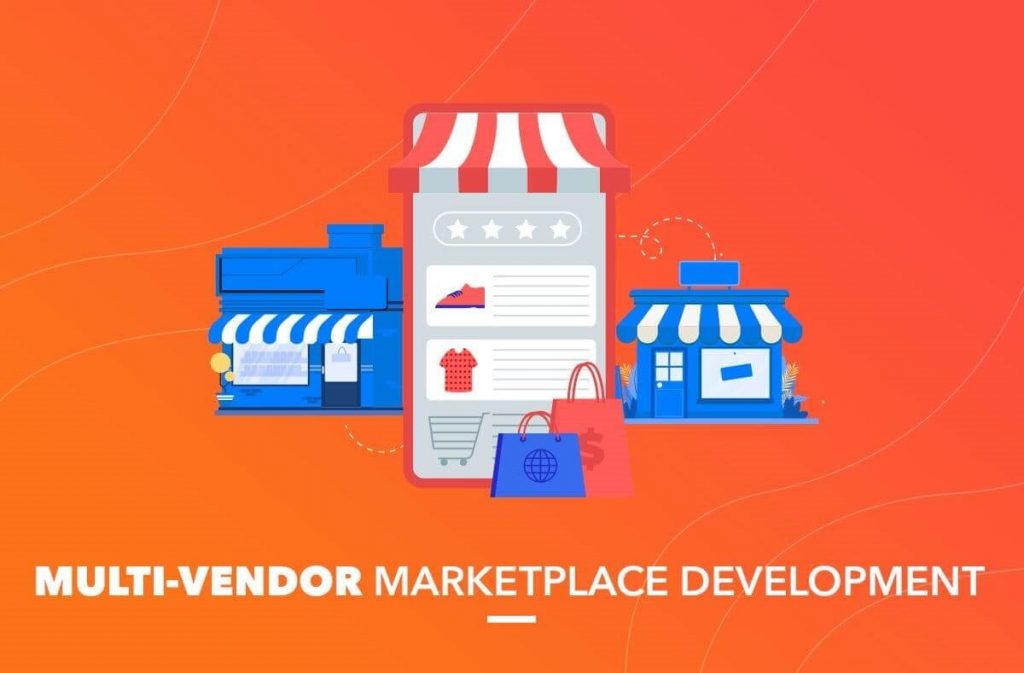
During the past six months, our team has received many clients’ requests for the development and implementation of various multi-vendor marketplaces, including Magento. In the process of working, we have developed a clear vision of the most critical aspects of marketplace development to consider.
Oftentimes potential investors do not fully understand how many details they need to be careful about before starting to create an online marketplace. That's why we have compiled a guide of what the customer needs to know before starting a technical specification of a project.
What Is a Multi-vendor Marketplace Platform?
A multi-vendor marketplace (or simply an online marketplace) is an e-commerce platform which contains peculiarities such as:
- Independent sellers. All the products are offered by different sellers (vendors). That's why the buyers can choose to purchase products from different people depending on whom they trust.
- Sellers with complete control. They manage all their items, sales, bills, and deliveries through a personal interface.
- Commission fees and payment processing. As the owner of a multi-vendor online store, you profit from commission fees for every order or purchase within the platform.
The main difference between a multi-vendor marketplace software and a regular online store is the number of sellers. Here the buyer does not purchase the products directly from the website owner but chooses a particular vendor. The most well-known examples of such marketplaces are Amazon and eBay.
On most such platforms, you will not find its own products or services. Nevertheless, the online marketplace owner controls the interaction between sellers and buyers and provides safe purchases.
At first glance, it seems that the creation of such a website is challenging. Let's take a look at how to develop an e-commerce website to see whether it is really that difficult.
How to Build a Multi-vendor Marketplace Based on Magento
Marketplace building can be time-consuming and expensive, especially if you are making a platform from scratch. However, owning such a website is a potentially profitable business.
Stages of developing a multi-vendor platform from scratch:
- Industry and business analysis;
- Technical documentation creation;
- UI/UX design development;
- Platform development;
- QA and testing;
- Website launching;
- Further technical support.
An entrepreneur is only responsible for a detailed analysis of the market. To become successful in sales, it is crucial to know and understand the current market and determine your ambitions. An in-depth understanding of the target audience will help to provide useful features and a convenient interface. In fact, there are a huge number of aspects you should think about before developing a marketplace.
When it comes to the subsequent stages, it is better to relegate them to professional engineers who do their job at the highest level. Moreover, you can also transfer the analysis of the industry and competitors to an outsourcing company to avoid extra work. Based on our experience, there is no need to worry about the outcome since our goal is to communicate with the clients as much as possible. Our experienced team understands how important it is for entrepreneurs to keep in the loop and control every step. At each stage, we provide customers with the most up-to-date results to estimate the work in progress.
The duration and cost of each development stage are based on customer requirements. After building the website, our team will show you how to use the marketplace and answer all your questions.
Magento Multi-Vendor Extensions
A common way to develop marketplaces is the Magento platform. Choosing this platform you’ll get an extremely flexible, scalable, and feature-rich solution. There are a great variety of Magento extensions for online retailers that help a website effectively gain users’ loyalty. Let’s see some of the most useful Magento multi-vendor marketplace extensions:
- Amasty Improved Layered Navigation. The extension simplifies the search for the users. It allows using various filters that help to find a particular product faster and easier. It increases the likelihood of purchase several times over.
- AheadWorks Follow-Up Email. This feature will help your vendors to return their potential clients. If users have abandoned their cart with a product, the extension will send them a letter with a reminder.
- Fooman Email Attachments. For those who want to quickly deal with the attached files, there is the Fooman Email extension. The administration will no longer need to spend so much time on creating emails after installing it.

Types and Business Models of Multi-vendor Platforms
The first and the most important thing to decide before developing a marketplace is the business model. What strategy will be the most efficient for your business? We recommend thinking of the following aspects.
Commission
The most popular business model for a modern multi-vendor marketplace is charging a commission on every purchase. When a customer pays a vendor, the marketplace gets either a percentage from the transaction or a fixed fee. The main advantage of this model is that the sellers do not have to pay before receiving any value from the marketplace, and the buyers can be sure that the deal is honest.
At the same time, such a platform needs to be beneficial. Otherwise, users will find a way to ignore the payment system. Despite that, this marketplace type is usually the most profitable. Examples include Airbnb, Etsy, eBay, Fiverr, TaskRabbit, and Uber. Before building this kind of platform, you need a detailed business plan.
Subscription
In this case, users pay a certain charge to get access to the marketplace, and the platform helps sellers to find new customers. Typically, such a website approves users and requires their personal information to create a sense of exclusivity that justifies the fee. Thus, users feel protected from impostors and frauds.
Another option is to make the platform free for buyers and require a paid subscription from vendors. For example, you can look at LinkedIn and StackOverflow Careers, which charge companies a monthly fee for their job archive. To make this model work from the start, when your marketplace has not yet gained trust, offer significant discounts for new users or give them a free trial.
Payment per publication
Some marketplaces charge sellers for each posting. The website combines various ads in one category and guarantees that it will reach the majority of users. The most recognizable example in this category is Craigslist, where people can post ads about their products, services, jobs, apartments, and so on. This type can be more efficient than a subscription one if users do not need the service all the time and only want to sell something once in a while.
Payment per lead
This model is a better choice for sellers than the pay-per-publication type. The vendor only pays while talking to a potential client. But it only works if the cost per lead is high enough and guarantees long-term relationships (b2c or b2b services). Thumbtack is a great example of a b2c marketplace for all kinds of local services, from plumbers to tutors.
Advertising
This type of marketplace provides free posting on the platform, but the sellers can pay to promote their product on the website’s main page or at the top of a certain category. Even Etsy has a similar promotion as one of its premium services. The ads are a popular source of income for marketplaces. But in this case, your profit can be much smaller than with a commission from each transaction. Still, you can combine the advertising with any other type of multi-vendor platform. But do not forget that users are mostly skeptical about ads. An excess of them can negatively affect the platform.
The Preparation Process before Development
The number of users and transactions on a marketplace directly depends on your plans and ambitions. It is a crucial stage that affects the project’s further stable operation, capability, and growth. The preparation process is simple if you follow a few recommendations. Our experts have compiled a list of important aspects to consider. These will help you avoid mistakes that can slow down the product or lead to big losses. We aim to provide an efficient project that will yield results.
Based on our team’s experience, these are the most important points to think about:
- What kind of multi-vendor e-commerce platform do you need? (Niche, type)
- What is the size of the marketplace’s commission? (If you choose this business model)
- Is it B2C, B2B, C2C, or mixed?
- Who will be adding, editing, and managing the products? (suppliers and vendors or website administration)
- Will an administrator check products after vendors add them?
- Can different vendors sell the same products?
- Who will be delivering orders to users? (centralized delivery and storage, delivery from a warehouse, or each seller should decide individually)
- How will the users pay? Are they protected from fraud?
- Can products from different vendors be combined in one order?
- Who will be controlling the number of products and if they are in stock?
This list of questions will help you determine the ultimate functions of the platform. You will understand what features you want to implement and how to coordinate the marketplace’s work. Thus, the process will be quick and efficient.
How to Create the Best Multi-Vendor E-commerce Platform?
One of the crucial aspects of quality product development is having a team of professional engineers. For successful project implementation, it is vital to choose professionals for every stage. We have analyzed our team’s experience in various projects to create the perfect team formula. A reliable technical team should be able to not only develop your website but to become a full-fledged partner ready to go through all the stages with you: from business consulting to product launching.
The entire team should be sufficiently experienced and well-rounded since they will be responsible for the outcome. Apart from the classic set of designers and programmers, we also suggest engaging a good technical business analyst, an architect, a project manager, and a tester.
SoftLoft specializes in Magento multi-vendor development and provides customers with various types of marketplaces. We have been partners with Shorb, TheKairosCollective, and many other major online retailers. Leverage our vast experience and deep expertise to create the most efficient eCommerce solution. SoftLoft engineers can take on projects of any complexity since we have broad expertise in Magento integration with ERP, CRM, and other systems.
If you have any questions or need a consultation, do not hesitate to contact us. Make your ideas come true!



